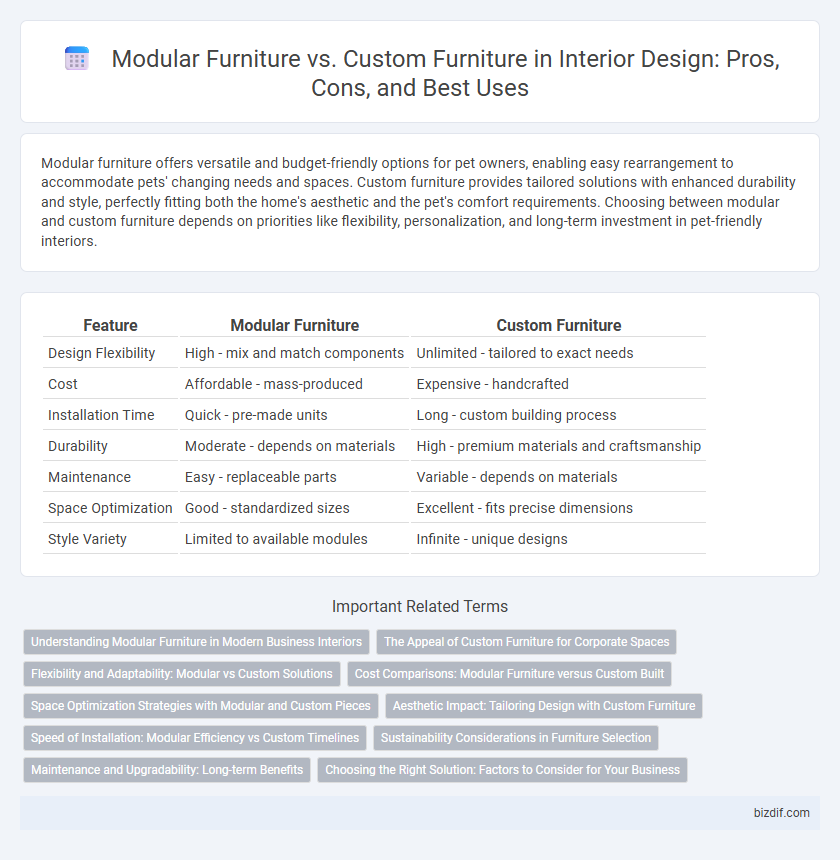Modular furniture offers versatile and budget-friendly options for pet owners, enabling easy rearrangement to accommodate pets' changing needs and spaces. Custom furniture provides tailored solutions with enhanced durability and style, perfectly fitting both the home's aesthetic and the pet's comfort requirements. Choosing between modular and custom furniture depends on priorities like flexibility, personalization, and long-term investment in pet-friendly interiors.
Table of Comparison
| Feature | Modular Furniture | Custom Furniture |
|---|---|---|
| Design Flexibility | High - mix and match components | Unlimited - tailored to exact needs |
| Cost | Affordable - mass-produced | Expensive - handcrafted |
| Installation Time | Quick - pre-made units | Long - custom building process |
| Durability | Moderate - depends on materials | High - premium materials and craftsmanship |
| Maintenance | Easy - replaceable parts | Variable - depends on materials |
| Space Optimization | Good - standardized sizes | Excellent - fits precise dimensions |
| Style Variety | Limited to available modules | Infinite - unique designs |
Understanding Modular Furniture in Modern Business Interiors
Modular furniture in modern business interiors offers flexibility, efficient space utilization, and scalability, making it ideal for dynamic work environments. Unlike custom furniture, modular pieces can be easily reconfigured or expanded to adapt to evolving office layouts and team needs. This adaptability supports collaboration, enhances productivity, and reduces long-term costs by accommodating growth without requiring complete replacements.
The Appeal of Custom Furniture for Corporate Spaces
Custom furniture in corporate spaces offers unparalleled personalization, allowing businesses to align furnishings perfectly with their brand identity and workspace requirements. Tailored designs enhance functionality and ergonomics, promoting employee comfort and productivity while optimizing spatial layout. Unlike modular furniture, custom pieces incorporate unique materials and finishes that elevate the aesthetic appeal and create a distinctive professional environment.
Flexibility and Adaptability: Modular vs Custom Solutions
Modular furniture offers unparalleled flexibility and adaptability, allowing users to easily reconfigure pieces to suit changing spatial needs and preferences. Custom furniture, while tailored to specific dimensions and styles, provides a fixed solution that excels in unique design integration but lacks the immediate versatility of modular systems. Choosing between modular and custom furniture depends on the balance between the need for dynamic adaptability and the desire for personalized, one-of-a-kind pieces in interior design projects.
Cost Comparisons: Modular Furniture versus Custom Built
Modular furniture typically offers a more affordable solution compared to custom built options, with costs ranging from $150 to $300 per piece, depending on materials and brand, while custom furniture can exceed $1,000 due to bespoke craftsmanship and premium materials. The modular approach reduces labor and design expenses through mass production and standardization, making it ideal for budget-sensitive projects or frequent reconfigurations. Custom furniture, however, provides unique, high-quality finishes and precise dimensions, often justifying higher costs for luxury interiors or specific spatial requirements.
Space Optimization Strategies with Modular and Custom Pieces
Modular furniture offers flexible space optimization through adaptable components that can be rearranged or expanded to fit varying room dimensions, making it ideal for small or multifunctional spaces. Custom furniture maximizes space by tailored designs that precisely utilize unique architectural features and specific storage needs, ensuring no area remains unused. Combining modular and custom pieces creates a balanced environment that adapts over time while addressing personalized spatial constraints effectively.
Aesthetic Impact: Tailoring Design with Custom Furniture
Custom furniture offers unparalleled aesthetic impact by allowing precise tailoring of design elements to match unique interior themes and personal tastes. Unlike modular furniture, which follows standardized patterns for flexibility and functionality, custom pieces emphasize craftsmanship and distinctive styles that elevate the overall ambiance of a space. The ability to incorporate specific materials, finishes, and dimensions ensures a cohesive and personalized visual statement in any interior design project.
Speed of Installation: Modular Efficiency vs Custom Timelines
Modular furniture offers rapid assembly due to its pre-fabricated components, significantly reducing installation time compared to custom furniture. Custom furniture requires extended timelines for design, crafting, and on-site adjustments, impacting overall project scheduling. Choosing modular solutions accelerates deployment in commercial and residential interiors, optimizing workflow efficiency without compromising style.
Sustainability Considerations in Furniture Selection
Modular furniture offers enhanced sustainability through its adaptability and ease of disassembly, enabling users to replace parts and extend the product lifecycle while minimizing waste. Custom furniture, although often made from sustainably sourced materials, may lack the flexibility to adapt to changing needs, potentially leading to earlier disposal and higher environmental impact. Selecting furniture with certifications like FSC or GREENGUARD ensures both modular and custom options contribute to eco-friendly interior design practices.
Maintenance and Upgradability: Long-term Benefits
Modular furniture offers superior upgradability and easier maintenance through interchangeable components, reducing replacement costs over time. Custom furniture provides tailored durability but often requires specialized repair and limited adaptability for style or function changes. Choosing modular designs enhances long-term benefits by simplifying upgrades and minimizing wear-related expenses.
Choosing the Right Solution: Factors to Consider for Your Business
Selecting between modular furniture and custom furniture depends on factors such as budget, space flexibility, and brand identity. Modular furniture offers adaptability and cost-effectiveness for dynamic office layouts, while custom furniture provides tailored designs that reinforce unique business aesthetics. Evaluating workflow requirements and long-term scalability ensures the optimal choice for enhancing workplace functionality and employee comfort.
Modular Furniture vs Custom Furniture Infographic

 bizdif.com
bizdif.com